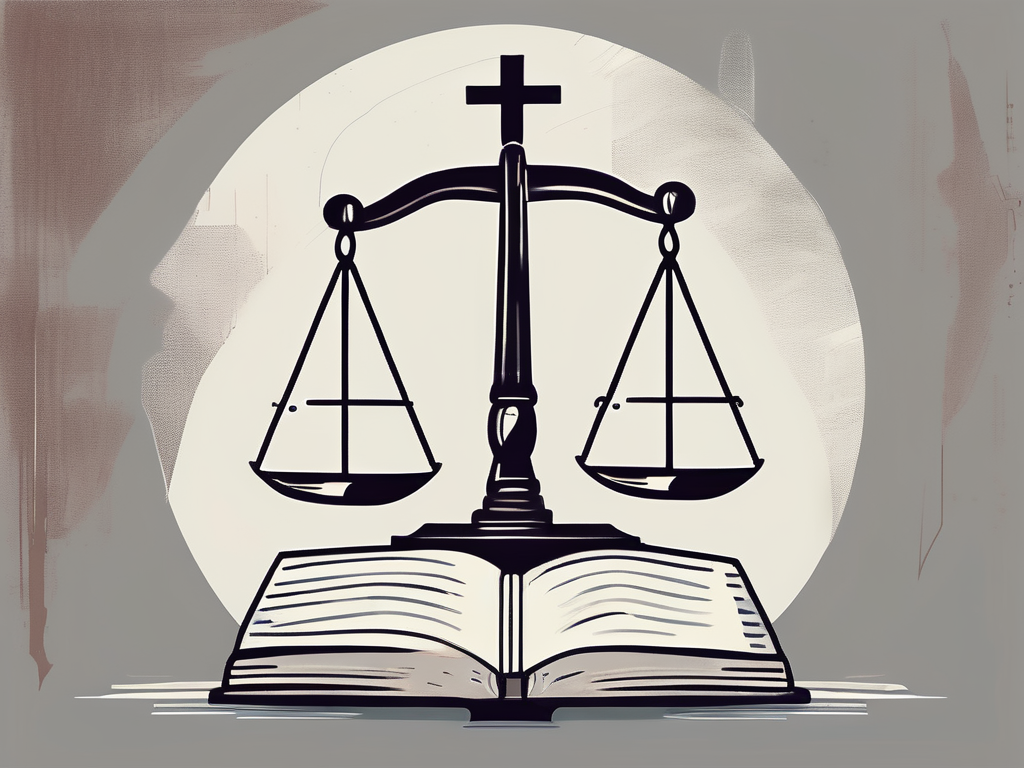The Bible, as a revered religious text, provides guidance and insights on various aspects of life, including the role of government. Understanding the biblical perspective on government can help shape our understanding of leadership, justice, and the responsibilities of citizens. Let’s delve into the Scriptures to explore what the Bible says about government.
Understanding the Biblical Perspective on Government
The biblical perspective on government can be gleaned from various passages and stories that highlight the interactions between rulers, citizens, and God. By examining the roles of government in the Old Testament and the New Testament, we gain a comprehensive understanding of how the Bible addresses this topic.
The Role of Government in the Old Testament
The Old Testament provides numerous examples of God’s chosen leaders guiding and governing His people. From Moses to David, we witness how these leaders upheld justice, established laws, and protected the well-being of the community. For example, Moses, under God’s guidance, led the Israelites out of slavery in Egypt and established a system of governance that included judges and elders who would settle disputes and administer justice.
Throughout the Old Testament, we see that the government played a crucial role in maintaining order and promoting the welfare of the people. The leaders were not only responsible for enforcing laws but also for ensuring that the vulnerable and marginalized members of society were protected. They were called to be the voice of God and to lead the people in righteousness.
One notable example of this is King Solomon, known for his wisdom and just rule. During his reign, he made decisions that showcased his discernment and fairness, such as the famous story of two women claiming to be the mother of a baby. Solomon’s ruling to divide the child in half to determine the true mother revealed his wisdom and ability to administer justice.
The Role of Government in the New Testament
In the New Testament, Jesus and his disciples navigated a world where the Roman Empire held ultimate authority. While the Bible doesn’t provide a detailed blueprint for the structure of government, it emphasizes the importance of respecting and submitting to earthly authorities. Jesus himself acknowledged the authority of the Roman government when he said, “Render to Caesar the things that are Caesar’s, and to God the things that are God’s” (Matthew 22:21).
Although the New Testament does not explicitly outline the specific responsibilities of government, it does highlight the broader principles of justice, compassion, and righteousness that should guide those in positions of authority. The government’s role in the New Testament centered on maintaining societal order and indirectly supported the spreading of the Gospel.
One example of this indirect support can be seen through the apostle Paul’s interactions with various governmental authorities. Despite facing persecution and imprisonment, Paul respected the authority of the Roman government and used his trials as opportunities to share the message of Christ. His respectful and peaceful approach demonstrated the importance of honoring earthly authorities while remaining steadfast in the pursuit of God’s kingdom.
Furthermore, the New Testament encourages believers to pray for those in authority (1 Timothy 2:1-2) and to be model citizens who contribute positively to society. Christians are called to be salt and light in the world, influencing their communities through love, compassion, and justice.
In conclusion, the biblical perspective on government emphasizes the importance of just and righteous leadership. Both the Old Testament and the New Testament provide examples of leaders who upheld these values and sought to promote the welfare of their people. While the Bible does not prescribe a specific form of government, it calls believers to respect and submit to earthly authorities while remaining faithful to God’s ultimate authority.
Biblical Principles on Leadership and Authority
Leadership and authority play significant roles in both religious and secular settings. Understanding the concept of authority in the Bible and the qualities that the Scriptures highlight can help shape our understanding of effective leadership.
The Concept of Authority in the Bible
In the Bible, authority is not meant to be oppressive but rather a responsibility to be carried out with humility and compassion. Jesus himself demonstrated servant leadership, emphasizing the importance of serving others rather than exalting oneself. This biblical concept of authority calls leaders to act as servants, working for the betterment of those they govern.
When we look at biblical examples, we see that authority is not about power and control, but about stewardship. It is about using the position of leadership to serve and uplift others. Moses, for instance, led the Israelites out of Egypt not because he sought personal glory, but because he was called by God to deliver His people from oppression. This exemplifies the biblical understanding that authority is a divine appointment, and leaders are accountable to God for their actions.
Furthermore, the concept of authority in the Bible extends beyond just those in positions of power. It also applies to parents, teachers, and spiritual leaders. In each of these roles, the responsibility of authority is to guide, nurture, and protect those under their care.
Biblical Qualities of a Good Leader
Biblical teachings emphasize various qualities and virtues that make for good leaders. Leaders should be just, wise, and filled with integrity. They should prioritize the well-being of their constituents over personal gain. The Bible teaches us that a good leader listens to the voice of the people, seeks wisdom from God, and acts with fairness and compassion.
One biblical example of a good leader is King Solomon. Known for his wisdom, Solomon was faced with a difficult decision when two women came to him, both claiming to be the mother of a baby. Instead of hastily making a judgment, Solomon listened attentively to both sides and sought divine wisdom to discern the truth. His decision to suggest dividing the baby in half revealed not only his wisdom but also his compassion for the child’s well-being.
Another quality that the Bible highlights is humility. Humble leaders recognize that their authority is not about personal glory but about serving others. Jesus, the ultimate example of humility, washed the feet of his disciples, showing that true leadership is about selflessness and putting others’ needs before our own.
In addition to these qualities, the Bible also teaches that good leaders should be accountable and transparent. They should be open to feedback, willing to admit their mistakes, and strive for personal growth. King David, despite being a man after God’s own heart, made grave mistakes in his leadership. However, when confronted by the prophet Nathan, David humbly acknowledged his wrongdoing and repented, setting an example of accountability for future leaders.
Overall, the Bible provides a rich source of wisdom and guidance on leadership and authority. It teaches us that true leadership is not about exerting power and control, but about serving others with humility, compassion, and integrity. By following these biblical principles, leaders can create a positive impact and inspire those under their authority to thrive and flourish.
The Bible’s View on Laws and Justice
Laws and justice are essential components of any functioning society. Let’s explore the importance of laws in the Bible and the biblical teachings on justice and fairness.
The Importance of Laws in the Bible
The Bible places great emphasis on the importance of laws in maintaining order and promoting righteousness. The laws given in the Old Testament outline principles that govern the behavior of individuals, relationships, and the community as a whole. These laws serve to protect the vulnerable, promote justice, and establish a framework for a just social order.
One example of the importance of laws in the Bible can be found in the Ten Commandments. These commandments, given by God to Moses on Mount Sinai, provide a moral and ethical foundation for the Israelites. They cover a wide range of areas, including the worship of God, the treatment of others, and the respect for property. By following these laws, the Israelites were able to live in harmony with one another and with God.
In addition to the Ten Commandments, the Bible contains numerous other laws that address various aspects of life. These laws cover topics such as marriage, inheritance, agriculture, and even hygiene. By providing specific guidelines for different situations, the Bible ensures that justice is upheld and fairness is maintained.
Biblical Teachings on Justice and Fairness
Justice and fairness are central to the biblical teachings on government. The Bible condemns the oppression of the weak and the mistreatment of the marginalized. It calls for rulers and officials to administer justice impartially, without favoritism. The biblical concept of justice goes beyond the mere punishment of wrongdoing and seeks restoration and reconciliation.
One of the key principles of justice in the Bible is the idea of treating others as you would like to be treated. This concept, often referred to as the Golden Rule, can be found in various passages, including Matthew 7:12 which states, “So whatever you wish that others would do to you, do also to them, for this is the Law and the Prophets.” This teaching emphasizes the importance of fairness and empathy in our interactions with others.
Furthermore, the Bible teaches that justice should be accompanied by mercy. In Micah 6:8, it says, “He has shown you, O mortal, what is good. And what does the LORD require of you? To act justly and to love mercy and to walk humbly with your God.” This verse highlights the need for compassion and forgiveness in our pursuit of justice.
Overall, the Bible’s view on laws and justice is one that promotes fairness, compassion, and the well-being of all individuals. By following these teachings, we can strive to create a just society where everyone is treated with dignity and respect.
The Bible on Citizens’ Responsibilities
As citizens, the Bible provides guidance on our responsibilities towards government and authority figures. Let’s explore the duties of citizens according to the Bible and the Bible’s guidance on respecting authority.
The Bible not only serves as a spiritual guide but also offers valuable insights into how citizens should navigate their roles within society. It emphasizes the importance of actively engaging in the community and fulfilling our obligations as responsible citizens.
Duties of Citizens According to the Bible
When it comes to our duties as citizens, the Bible offers clear instructions. It encourages us to respect and obey the governing authorities, recognizing their role in maintaining order and promoting justice. This means that as citizens, we should strive to be law-abiding and contribute to the well-being of society.
One of the fundamental duties highlighted by the Bible is the payment of taxes. While taxes may not always be a popular subject, the Bible reminds us of the importance of fulfilling this financial responsibility. By paying our taxes, we contribute to the functioning of government institutions and the provision of essential services that benefit the entire community.
In addition to paying taxes, the Bible also encourages citizens to participate in civic duties. This can include activities such as voting, serving on juries, and engaging in community service. By actively engaging in these responsibilities, we play an active role in shaping our society and ensuring that the voices of citizens are heard.
Furthermore, the Bible emphasizes the significance of prayer for those in authority. Praying for our leaders, regardless of our personal opinions or political affiliations, demonstrates our commitment to seeking the well-being of our nation. Through prayer, we can ask for wisdom, guidance, and discernment for those in positions of power, recognizing that they face immense challenges and decisions that impact the lives of many.
The Bible’s Guidance on Respecting Authority
Respecting authority figures is paramount in the biblical teachings. While authorities may not always be perfect, the Bible reminds us that they are instituted by God to maintain order and promote justice. This does not mean blind obedience, but rather a recognition of the role that authority plays in society.
Respecting authority involves honoring their positions and recognizing the responsibilities they carry. It means treating them with dignity and showing them the respect they deserve as individuals fulfilling their designated roles. This respect extends to both elected officials and appointed leaders, regardless of our personal opinions or disagreements.
However, the Bible also acknowledges that there may be instances where authorities may act in ways that contradict God’s teachings. In such cases, the Bible encourages believers to prioritize their allegiance to God and His commandments. This means that while we respect authority, we must also discern when their commands or actions are contrary to the principles of justice, love, and righteousness that the Bible upholds.
When faced with conflicting instructions, the Bible encourages believers to follow God’s teachings and exercise civil disobedience if necessary. This does not mean engaging in violence or disrespect, but rather peacefully standing up for what is right and just, even if it means challenging the authority’s actions.
In conclusion, the Bible provides valuable guidance on the responsibilities of citizens and the importance of respecting authority. It emphasizes active engagement in the community, fulfilling our duties, and praying for those in authority. By following these teachings, we can contribute to the betterment of society and strive for a harmonious coexistence.
Separation of Church and State: A Biblical Perspective
The concept of the separation of church and state has been a topic of debate for centuries. Understanding the Bible’s stance on religion in government and the role of religion in a biblical society can shed light on this complex issue.
The Bible’s Stance on Religion in Government
The Bible does not explicitly address the concept of the separation of church and state as it emerges in modern discourse. However, it advocates for religious freedom and encourages believers to follow the laws of the land. The Bible emphasizes the importance of rendering unto Caesar what is Caesar’s, highlighting the compatibility of faith and obedience to governmental authorities.
The Role of Religion in a Biblical Society
In a biblical society, religion plays a crucial role in shaping morals, values, and individual conduct. While the Bible does not advocate for a theocratic form of government, it encourages believers to bring their faith into the public sphere, living out their convictions and being a positive influence in society. A biblical society recognizes the freedom of religious expression while upholding fairness and justice for all.
In conclusion, the Bible offers invaluable insights into the role of government, leadership, justice, and citizens’ responsibilities. By examining the Scriptures, we can find wisdom and guidance to navigate the complex relationship between religion and government while striving for a just and harmonious society.












